Public Health News
Major League Partnership
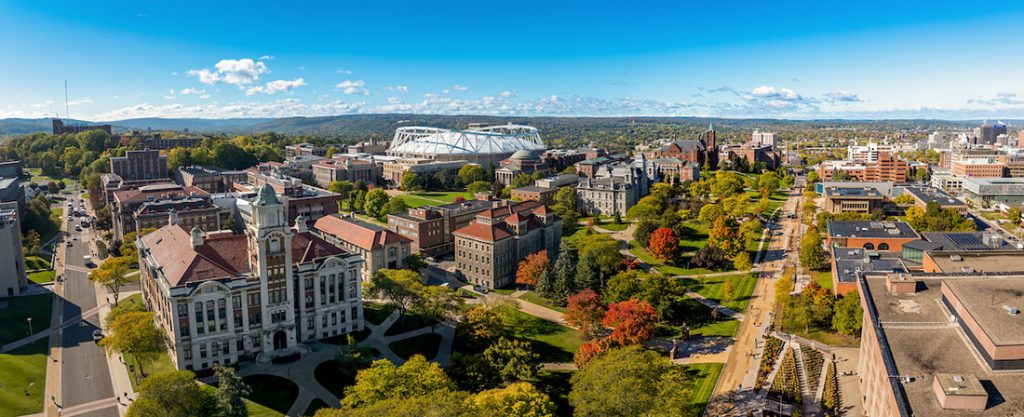
A new partnership between Syracuse University and the Major League Baseball Players Association (MLBPA) will create academic pathways for current and former players. Under this agreement, Syracuse University will offer market-relevant and industry-specific online degrees, certificates and credentials, as well as a range of non-credit professional development and executive education training programs, courses and workshops.
Responsive to the MLBPA’s desire to expand opportunities for career growth to its thousands of players, the new cross-campus collaboration taps into the expertise of several of the University’s schools and colleges, including the new David B. Falk College of Sport, the Newhouse School of Public Communications, the Whitman School of Management and the College of Professional Studies (CPS).
“My fellow deans and I are excited to partner with the Major League Baseball Players Association to provide the Syracuse University experience to those interested in pursuing our vast academic offerings,” says Falk College Dean Jeremy Jordan, whose initial discussions with the MLBPA inspired the creation of this new initiative. “This partnership reflects our collectively held value that higher education should be achievable for everyone, regardless of the demands of their profession or personal circumstances. For athletes and professionals with unpredictable schedules, our online programs offer the perfect balance of flexibility, robust academic support and real-world applicability—all without compromising their careers.”
“The Major League Baseball Players Association is thrilled to partner with Syracuse University to provide our members with exceptional educational opportunities,” says Chris Singleton, MLBPA special assistant for player resource programs and a former major league outfielder. “This collaboration underscores our commitment to supporting players both on and off the field, ensuring they have access to world-class academic resources that empower their personal and professional growth.”
The MLBPA represents the 1,200 players on major league 40-man rosters, as well as approximately 5,500 minor league players. This new partnership creates opportunities for these players to pursue several noteworthy objectives, including the following:
- Skill Development and Post-Career Readiness: The partnership will align market-relevant curricula and programming with players’ post-career aspirations and needs, ensuring they acquire meaningful skills and knowledge.
- Research and Innovation: The MLBPA and Syracuse will collaborate on research projects that inform progressive and advanced programming for professional athletes. These efforts may lead to the development of new technologies, products or processes, benefiting the MLBPA and other professional athletic organizations.
- Practical Experience: The partnership will provide Syracuse students with opportunities for internships, co-op programs and hands-on projects with the MLBPA. This practical experience will enhance learning, make students more competitive and serve as a potential pipeline for talent to the MLBPA and other professional athlete associations.
- Networking Opportunities: Players will gain access to professional mentors associated with Syracuse in sports, broadcasting and business, to aid them in post-playing career development and job opportunities.
Dedicated admission specialists and academic advisors will tailor academic pathways in support of the unique needs of each participant. These educational opportunities will be accessible through a number of formats, including online, on campus and at Syracuse’s Study Away sites in New York City, Washington, D.C., and Los Angeles. The University will also offer an online academic English program to prepare non-native English speakers for success in their non-credit programs, courses and workshops.
Visit the Syracuse University College of Professional Studies website to learn more about this innovative partnership.
About Syracuse University
Syracuse University is a private research university that advances knowledge across disciplines to drive breakthrough discoveries and breakout leadership. Our collection of 13 schools and colleges with over 200 customizable majors closes the gap between education and action, so students can take on the world. In and beyond the classroom, we connect people, perspectives, and practices to solve interconnected challenges with interdisciplinary approaches. Together, we’re a powerful community that moves ideas, individuals, and impact beyond what’s possible.
Examining Inequities
In the United States, unemployment rates skyrocketed, housing prices and stock portfolios plummeted, and the lives of millions were disrupted. More than 30 million individuals lost their jobs, and the rate of long-term unemployment doubled its historical high.
This past summer, Miriam Mutambudzi, an assistant professor in the Department of Public Health in the Falk College of Sport and Human Dynamics, received a National Institutes of Health (NIH) grant to conduct a two-year study on the effect of the Great Recession on older adults.
Specifically, the project aims to assess the combined impact of pre-recession and Great Recession precarity (uncertainty/insecurity) on employment and working conditions for older workers. In addition, the study is investigating how these economic factors–together with psychosocial working conditions–have differently influenced health biomarker trajectories and mortality outcomes by race, potentially shedding light on the disproportionately adverse outcomes observed among Black adults post-recession.
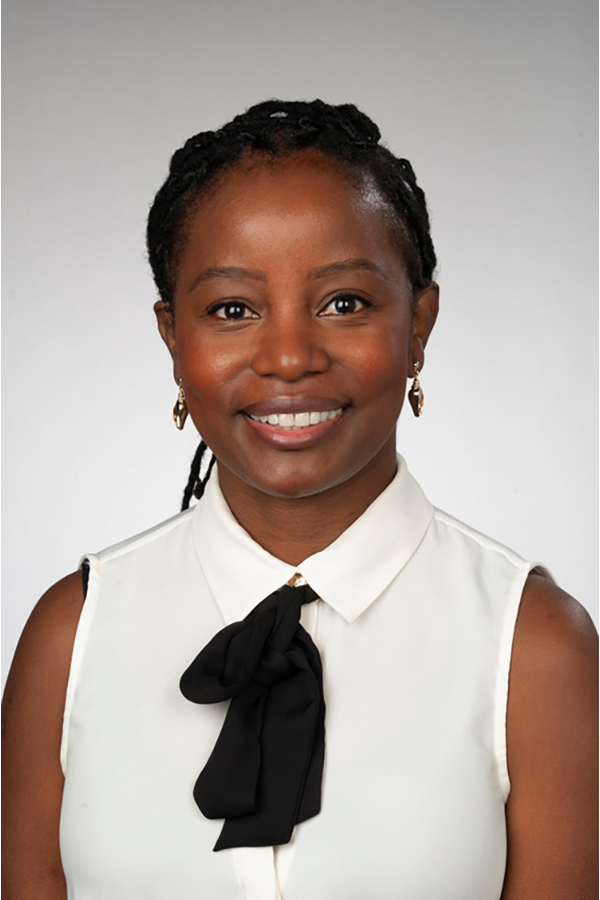
The impact of Mutambudzi’s research on the social determinants of health is felt throughout the Syracuse University campus as she’s a Faculty Affiliate of the Center for Aging and Policy Studies (CAPS), the Aging Studies Institute, and the Lerner Center for Public Health Promotion and Population Health in the Maxwell School of Citizenship and Public Affairs.
This past fall, Mutambudzi was selected as the 2024-26 Lender Center for Social Justice Faculty Fellow. In that role, Mutambudzi and Lender Student Fellows are exploring how Black adults who reside in historically redlined neighborhoods can experience a disadvantaged occupational life course and subsequent health consequences.
We reached out to Mutambudzi to learn more about her current research project, and here’s that discussion:
Why is this research important to you?
This area of research highlights how structural inequities, particularly in the labor market, perpetuate health disparities. By examining the cumulative impact of work-related disadvantages, i.e., precarity and poor working conditions, I aim to show the pathways through which these factors exacerbate racial and gender-based health inequities among older adults.
Understanding these mechanisms aligns with my broader commitment to addressing health inequities as structural issues rooted in systemic injustice.
What is the scope of your current study – for example, are you looking at all adults or just older adults – and how are you collecting your data?
The study focuses on older adults aged 50 and above. Data are drawn from the Health and Retirement Study (HRS) from 2006-2020, supplemented with HRS-linked Occupational Information Network Data (O*NET).
What are you looking for when you examine this data?
I am looking to better understand how pre-recession and Great Recession precarity independently and cumulatively affect health biomarker trajectories such as hbA1c, cholesterol, C-reactive protein, and systolic blood pressure, as well as all-cause mortality.
I am particularly interested in identifying racial and gender disparities in these effects and understanding how job strain and cumulative precarity interact to influence health outcomes.
How can your findings be used in the future to help mitigate the impact of economic factors on older and Black adults?
The findings can be leveraged to inform policy interventions that address the structural barriers that perpetuate health disparities among older vulnerable populations. For example, policies aimed at improving working conditions and strengthening social safety nets during economic downturns.
How does this research tie in with your role as the Faculty Fellow and your project with Student Fellows?
Both projects underscore the long-term health consequences of structural racism and economic marginalization. Insights from this R03 can improve our understanding of how occupational inequities compound the challenges faced by residents of historically redlined neighborhoods (a R03 grant is an NIH-funded program that supports smaller-scale research projects over a two-year period).
Visit the Falk College website to learn more about academic programs, career opportunities, and experiential learning in Syracuse University’s Department of Public Health.
Agent of Change
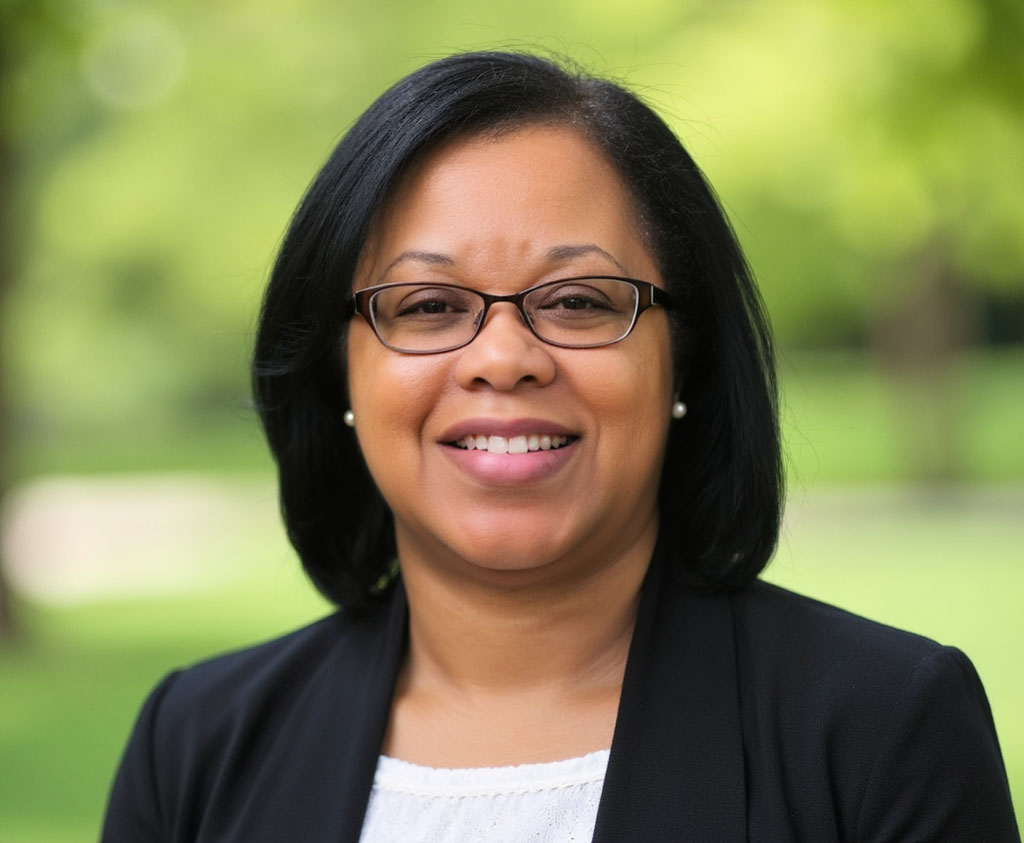
Chandice Haste-Jackson, Ph.D., Associate Dean of Student Services and interim Associate Dean of Diversity, Equity, Inclusion and Accessibility in Syracuse University’s Falk College of Sport and Human Dynamics, has been selected by the Executive Leadership Institute at Clark Atlanta University (HBCU ELI) as one of 46 outstanding candidates for its 2025 Community of Fellows.
This milestone celebrates individual achievements and underscores the critical importance of nurturing the next generation of executive leaders within Historically Black Colleges and Universities (HBCUs). Now in its fifth year, HBCU ELI is noted as one of the most prestigious executive leadership programs for HBCUs in the United States.
“I am honored to have been selected for the 2025 HBCU ELI Community of Fellows,” Haste-Jackson says. “Given the climate of higher education today, it is imperative that leaders are prepared to navigate through uncertainty and crisis and embody the skills and dispositions necessary to address contemporary and emerging issues.
“Participating in the HBCU ELI provides the opportunity to expand my skills and knowledge of higher education administration, and engage and learn from esteemed Legacy Leaders who have led institutions through the social, economic, racial, and historical contexts of higher education in this country,” she says.
Haste-Jackson, an associate teaching professor in the Department of Human Development and Family Science, has held a variety of leadership positions, including: Interim Director of First Year Seminar (FYS 101), Director of the Syracuse University School of Education Liberty Partnerships Program; Executive Director of a transitional housing homeless shelter for women and children; Executive Director of an historical African American settlement house; and Assistant Director of an inner-city community center.
Haste-Jackson received her bachelor’s degree in cultural anthropology from Syracuse University, her master’s degree in behavioral sciences-psychology from Cameron University, and her Ph.D. in child and family studies from Syracuse (now Human Development and Family Science). She currently serves on several nonprofit boards and is a consultant for the My Brother’s Keeper Syracuse initiative founded by President Barack Obama.
The Community of Fellows are proven executive leaders and change agents who participate in a series of virtual and residency seminars providing knowledge and hands-on skills. HBCU ELI offers a transformative learning experience that empowers participants to address the complex challenges facing HBCUs today. Through academic excellence, practical experience, and mentorship, graduates emerge as visionary leaders who are prepared to drive positive change and advance the legacy of HBCUs.
According to the National Center for Education Statistics, HBCUs were established prior to 1964 with the principal mission of educating Black Americans. Although these institutions were developed in an environment of legal segregation, they contributed substantially to the progress of Black Americans by providing access to higher education. The HBCUs of today welcomes students from all ethnic and international backgrounds and lead the way in creating inclusive and transformative cultures of belonging.
About HBCU ELI at Clark Atlanta University
The HBCU Executive Leadership Institute at Clark Atlanta University (HBCU ELI) is a groundbreaking incubator for recruiting and developing the future presidents of America’s Historically Black Colleges and Universities. ELI equips high-potential leaders with tools and strategies that support the education and business goals of more than 100 HBCUs. Through ELI, the ability of HBCUs to survive and thrive is improved. In addition to granting thousands of degrees each year, HBCUs boast illustrious alumni like Martin Luther King, Jr., Oprah Winfrey, and former Vice President Kamala Harris, among others. Visit hbcueli.com for more information and join the conversation on social media @hbcueli; #hbcueli.
Voices of Service
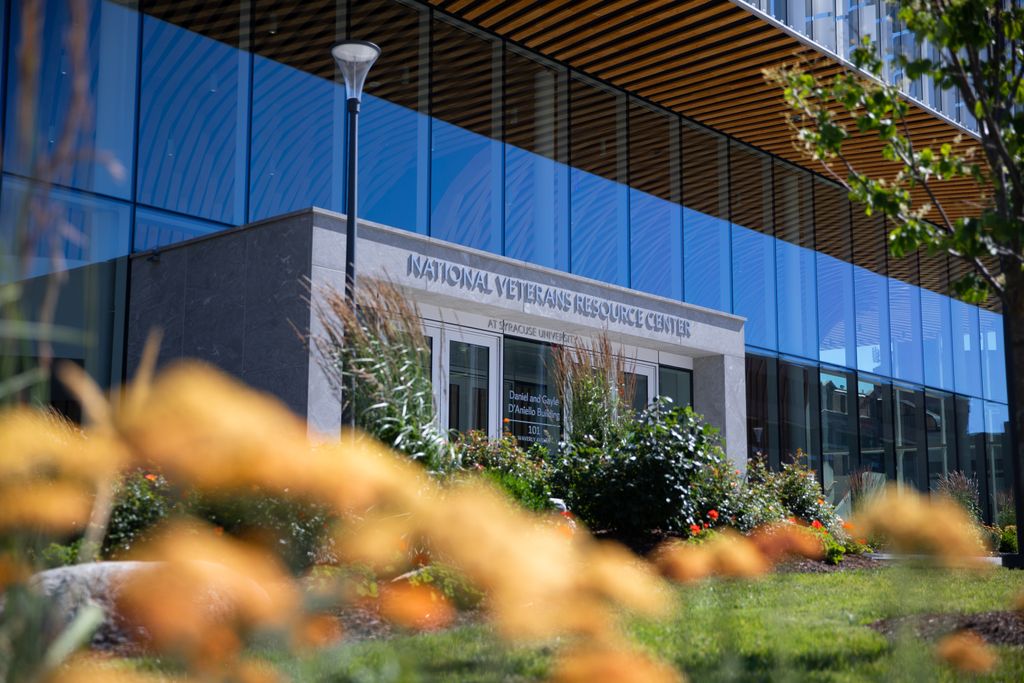
Call for Posters
The Institute for Veterans and Military Families (IVMF) and Academic Affairs invite you to submit poster abstracts for an inaugural event spotlighting diverse and dynamic work related to the interests and needs of veterans and military-connected populations. By showcasing ongoing and planned research projects, curricular innovations, program initiatives, and community engagement, we aim to amplify these efforts and foster new collaborations across our campus and community.
When and Where
- Date: April 10, 2025
- Location: National Veterans Resource Center (Syracuse University)
- Time: 12:30 PM – 3:00 PM
Who Should Submit and Attend?
- Syracuse University students (undergraduate, graduate) and trainees (postdocs)
- Syracuse University faculty and staff
- Community partners and collaborators in the Central New York region
Topics of Interest
We seek posters that highlight completed, planned, or in-progress research, curricular work, or applied services and programming related to the lived experiences, needs, or interests of veterans and/or military-connected families and individuals. We welcome contributions from all disciplines and fields that intersect with veteran and military-connected topics. Relevant topics include, but are not limited to, the following:
- Research Projects and Analyses that are completed, planned, or in-progress
- Curricular or Course-Related Efforts that focus on or integrate veteran- and military-related content
- Programs and Services that benefit or support veterans and/or military-connected populations
- Student Internships or Field Placements involving veteran research, support, outreach, or engagement
Important Dates
- Abstract Submission (250 words): Due by February 24, 2025
- Notification of Acceptance: By March 7, 2025
- Final Digital Poster Email Submission: By April 7, 2025, to Julianna Fitz at jlfitz@syr.edu
Submission Details
- Submit abstracts to Julianna Fitz at jlfitz@syr.edu
- Include: Title (up to 150 characters); Author name(s); Affiliation(s); and Email address(es)
Event Schedule
Requirements, Process, and Questions
- All presentations will be in person and posters must be printed.
- Presenting authors are requested to attend the poster session.
- Presenters are responsible for printing their own posters.
- Posters should be no larger than 30″ x 40″ (portrait or landscape).
- Easels, foam board, and binder clips will be provided.
- Posters will be accepted based on the quality of the abstract and the order received.
- For questions, please contact Jamie Winders at jwinders@syr.edu
Welcome Back!
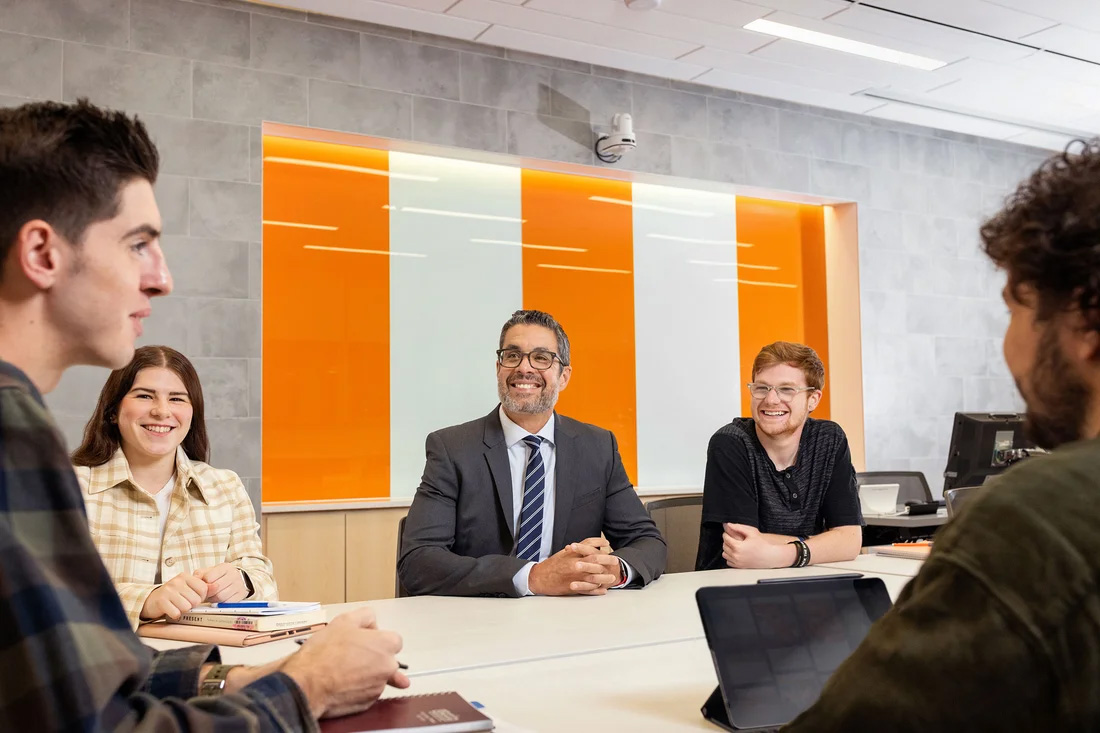
Dear Falk College Students,
Welcome back to Syracuse University! I hope you had a joyous holiday season and an opportunity to relax, spend time with family and friends, and enjoy the football team’s convincing win over Washington State in the Holiday Bowl!
I’m excited about the new semester and I look forward to watching all you will accomplish as you pursue your academic and professional goals this spring. As classes begin, I want to remind you of resources at Falk College and on campus that will help you succeed:
Official Syracuse University Communications
Syracuse University email is the primary communication method at the University. Your professors and University offices will contact you with important information using your Syracuse University email address (ending in “@syr.edu”), not your personal email address. It’s important to read your University email at least once every day so you’re aware of the latest information that’s essential to you.
Student Support Services
Falk College Student Services is an important resource in your support system at Syracuse University. Student Services counselors are here to provide you with academic advising and help you meet your requirements and goals. They are also your resource for private consultation related to student social and emotional concerns. If you have any concerns this semester, please contact Student Services or visit Falk 330, Barclay Suite, in the Falk Complex.
I encourage you to connect with the staff at Falk Career Services who can help you prepare for life after college through career exploration, internship and job searching, professional networking, and more. They are also located in Falk 330, or you can search for opportunities through Handshake, the University’s job search and professional events portal.
In addition, you can connect to spiritual life on campus at Hendricks Chapel, and health and counseling services in the Barnes Center at the Arch.
Student Spaces in Falk College
The Student Lounge, located in Falk 216, is available to you anytime the Falk Complex is open. The lounge has a microwave, refrigerator, and vending machines for student use. Across the hall from the Student Lounge is Falk Café, which is open from 8:00 a.m. to 3:00 p.m. Monday through Friday starting Jan. 13. Visit the Food Services website for up-to-date operating hours for cafés and dining centers across campus.
There are several computer labs in the Falk Complex. Falk 113 is a PC lab, and Falk 229 is a quiet study area that has both PCs and Macs available for your use. Both spaces are available to students at any time. Falk 400 and 407 are PC labs that are also used as teaching classrooms. When class is not in session, they are open for student use. You may check their schedule of availability using the 25Live website. You may also use the quick-print stations in Falk 216 and 229 for printing and email. These stations log out automatically after 10 minutes of use.
Ways to Get Involved
There are more than 300 student organizations at Syracuse University. Be sure to explore organizations that might be outside your usual interests, too. Remember, this is a great way to meet new people and discover something new about yourself!
There are many exciting events planned for Spring 2025, starting with the historic 40th Annual Rev. Dr. Martin Luther King Jr. Celebration Jan. 26 at the JMA Wireless Dome and leading to Commencement Weekend May 10-11. You can find more activities and events on campus by visiting the Syracuse University Calendar. For more resources and opportunities to make the most of your Syracuse experience, I encourage you to visit syracuse.edu/life/students.
I wish you the best this semester and please reach out to us if you’re in need of services and support. On behalf of the Falk faculty and staff, I wish you continued success on your journey here at Falk College and the wider Syracuse University community.
Go Orange!
Jeremy S. Jordan, Ph.D.
Dean
Falk College
On the Front Lines
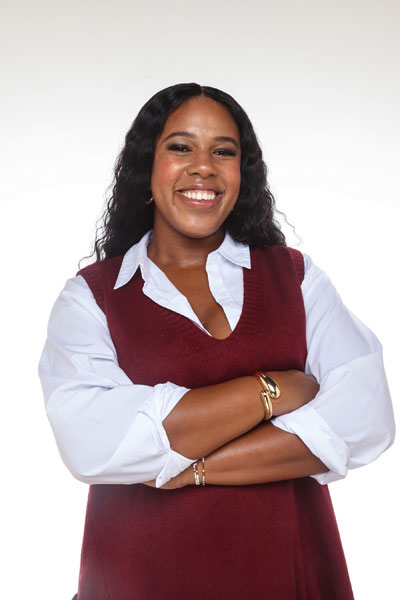
Almost five years since the start of the COVID-19 pandemic, the battle against the infectious disease continues and Falk College alumna Janelle Linton is on the front lines of Long COVID research.
Linton, who received her bachelor’s degree in public health from Falk in 2014, is a public health professional and the Assistant Program Director of Community Engagement for NYU Langone Health. Linton is an integral member of the Researching COVID to Enhance Recovery (RECOVER) initiative that was started by the National Institutes of Health in 2021, and she collaborated with patients, community members, caregivers, and researchers to develop an informational series called Discover RECOVER that presents RECOVER findings in simple, accessible language for the public.
Linton, who received her master’s degree in public health from New York University, recently appeared on a Member Spotlight Podcast with the Dulye Leadership Experience (DLE). In an interview with DLE Creative Coordinator and Syracuse University alum Jason McGill, Linton clarifies facts about Long COVID, discusses the challenges of keeping a remote team connected, and offers advice for pursuing a career in health care.
Watch the podcast on DLE’s YouTube channel.
The Dulye Leadership Experience is a valuable resource for individuals seeking to enhance their leadership skills and career advancement. Since its establishment in 2008 by Syracuse University alumna Linda Dulye, it has evolved from assisting job-seeking undergraduates to gaining national recognition in leadership development for professionals from all backgrounds, locations, and career stages. The DLE offers free resources such as workshops and networking opportunities, focusing on inclusive professional growth.
For more information, visit the DLE website.
Remembrance In Action
For Alyssa Sutherland and Tabitha Hulme, the title of Remembrance Scholar is not a responsibility they take lightly.
Syracuse University established the Remembrance Scholar program in 1989, one year after the December 1988 bombing of Pan Am 103 over Lockerbie, Scotland, that claimed the lives of all 270 people on board, including 35 Syracuse University students who were returning from a semester studying abroad. Each Remembrance Scholar is paired with a victim and is tasked with honoring that individual and keeping their memory alive.
When Sutherland found out she was accepted, she was studying abroad in India.
“I looked at my email and just immediately started crying,” says Sutherland, a public health major from St. Louis, Missouri. “It was instant honor and gratitude, but then as soon as you’re happy and excited, the next feeling that comes in is that weight and that heaviness of what that means to officially be a Remembrance Scholar.”
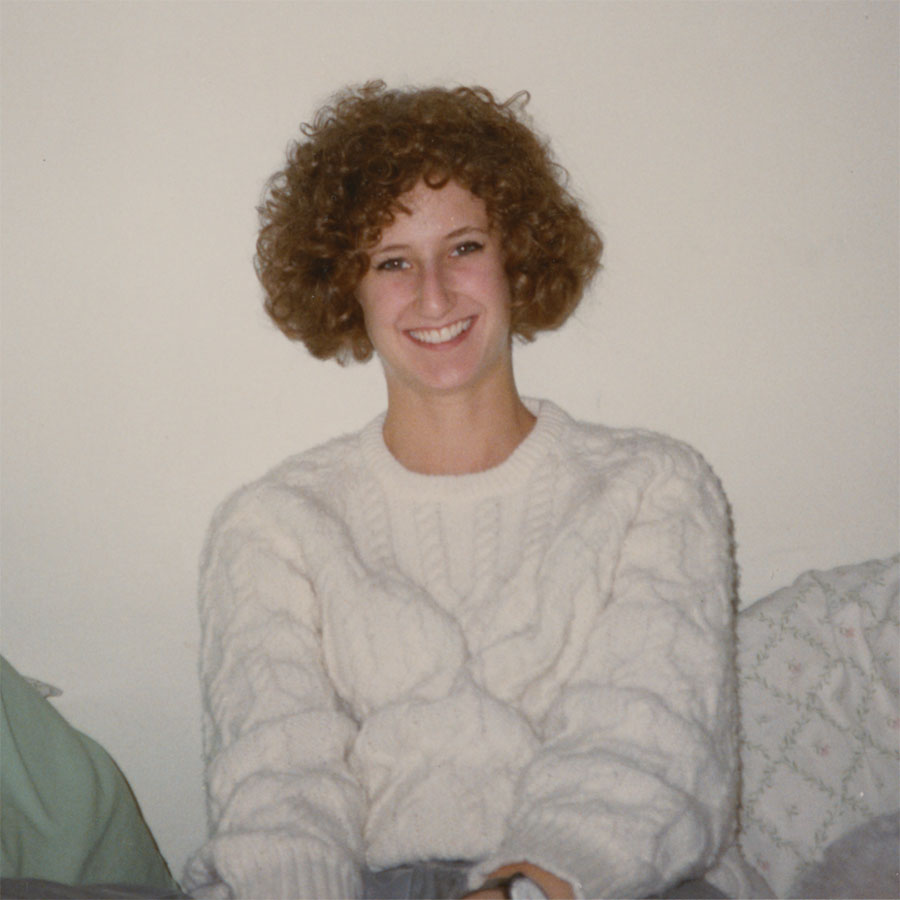
The news was equally emotional for Hulme, a public health major from Saratoga, California, whose grandfather had worked as a Pan Am pilot.
“I was on the phone with tech support for a computer problem when I got the email that I was selected as a Remembrance Scholar and I was so emotional I had to tell tech support I’d call them back,” Hulme says.
Sutherland’s scholarship is in honor of Miriam Luby Wolfe, a student in the College of Visual and Performing Arts who had spent her semester in London interning at King’s Head Theatre and studying dance, dramatic literature, acting, voice, and art history. Sutherland has connected through email with Miriam’s mother, Rosemary, who now lives in Hawaii. Rosemary sent Alyssa a copy of her book, “Miriam’s World—and Mine,” with a handwritten note, “For Alyssa, May life bring you many blessings. With love and Aloha! Rosemary.”
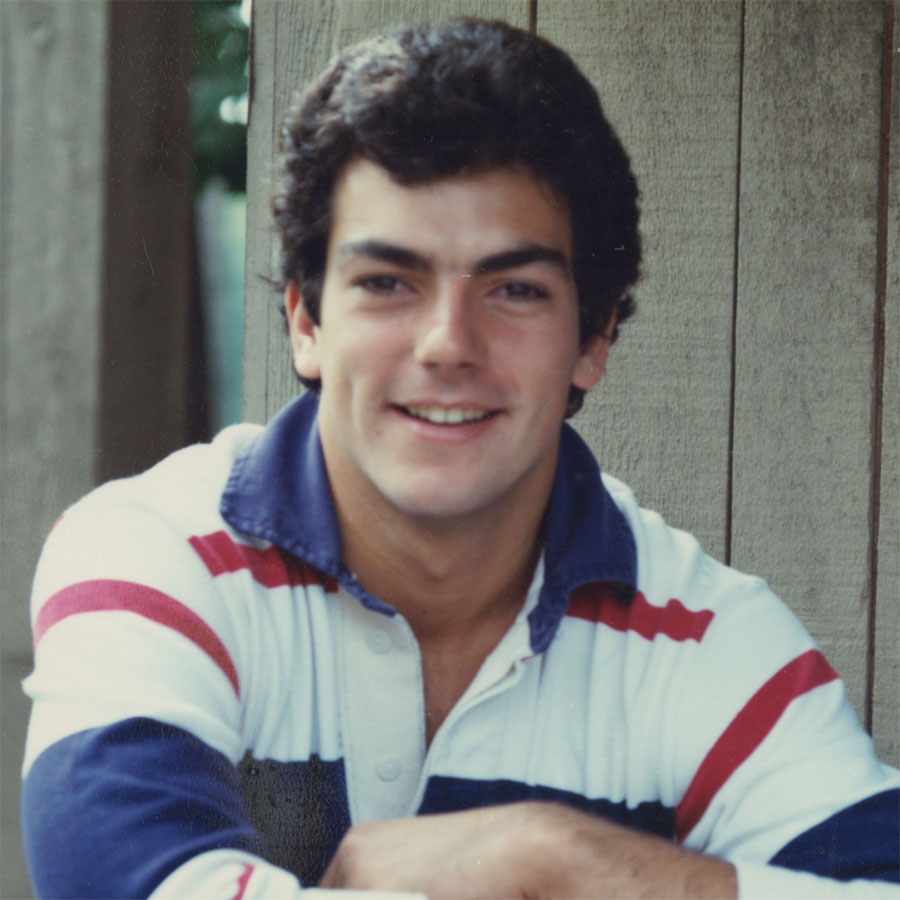
Hulme’s scholarship is in honor of Turhan Michael Ergin, a student in the College of Visual and Performing Arts. He was an actor and athlete who competed on the Syracuse University men’s lacrosse team. Tabitha learned about Turhan’s life by spending time in the Syracuse University Archives and having conversations with his friends, and she discovered almost kismet connections.
“There were so many commonalities between my life and his that I never expected to experience,” Hulme says. “In high school, he did journalism, and he got a national award for the type of journalism he did. It ended up that my father had actually received that same award when he was in high school.”
Sutherland and Hulme both share a strong dedication to service and intend to keep Miriam’s and Turhan’s memories with them throughout their lives. At this year’s Rose-Laying Ceremony, the two shared the following remarks:
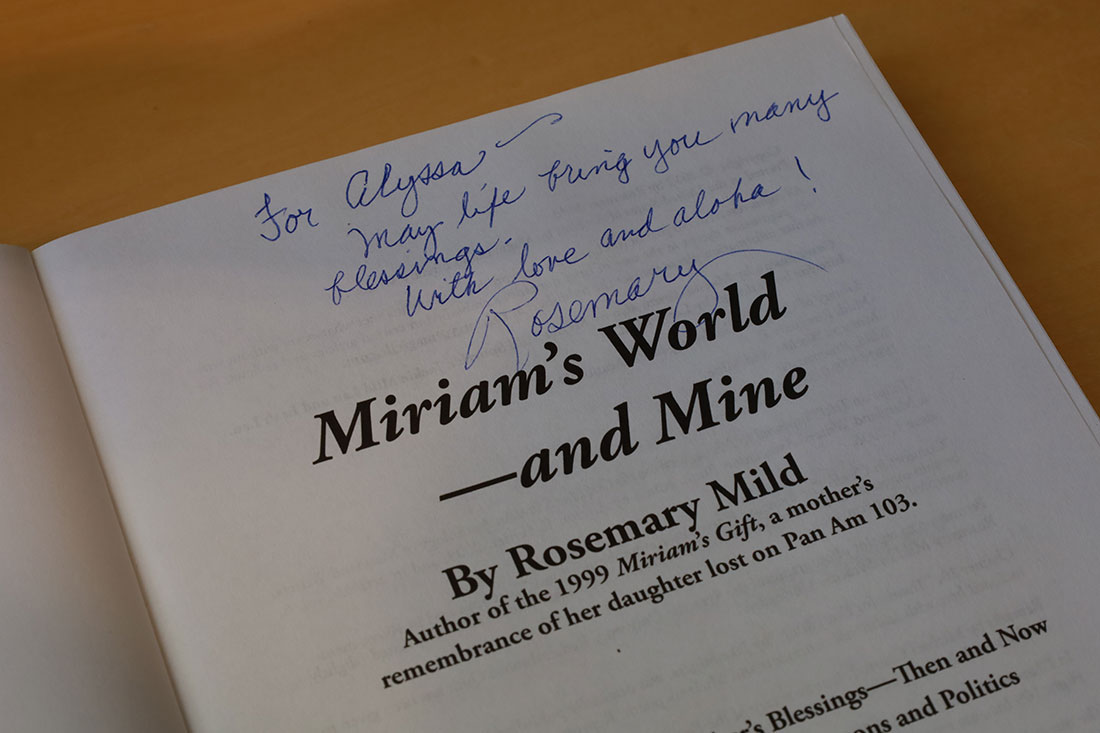
Sutherland: “I lay this rose in memory of Miriam Luby Wolfe. I am acting forward by being a leader on campus and beyond. I am using my skills to promote and teach cultural competency as well as the importance of inclusivity and interdependence in every community.”
Hulme: “I lay this rose in honor of Turhan Michael Ergin. When I think of the profound impact of Pan Am Flight 103, I am reminded of the quote, ‘Grief is love with no place to go.’ This flight–meant to bring together family members, friends, beliefs, stories, cultures, and, above all else, love–has changed my perspective on action. As a pre-medical student studying public health and health humanities, I plan to act forward by pursuing a career as a physician focused on patient equity and forever a dedication to service.”
The annual Pan Am Flight 103 memorial service will be held at 2:03 p.m. EST on Dec. 21 at Hendricks Chapel (that is the time of the incident over Lockerbie). The service will begin in the chapel’s Noble Room, with attendees then processing to the Place of Remembrance.
Learn more about the Remembrance Scholar program and apply online to be a Remembrance Scholar.
Falk College FAQs
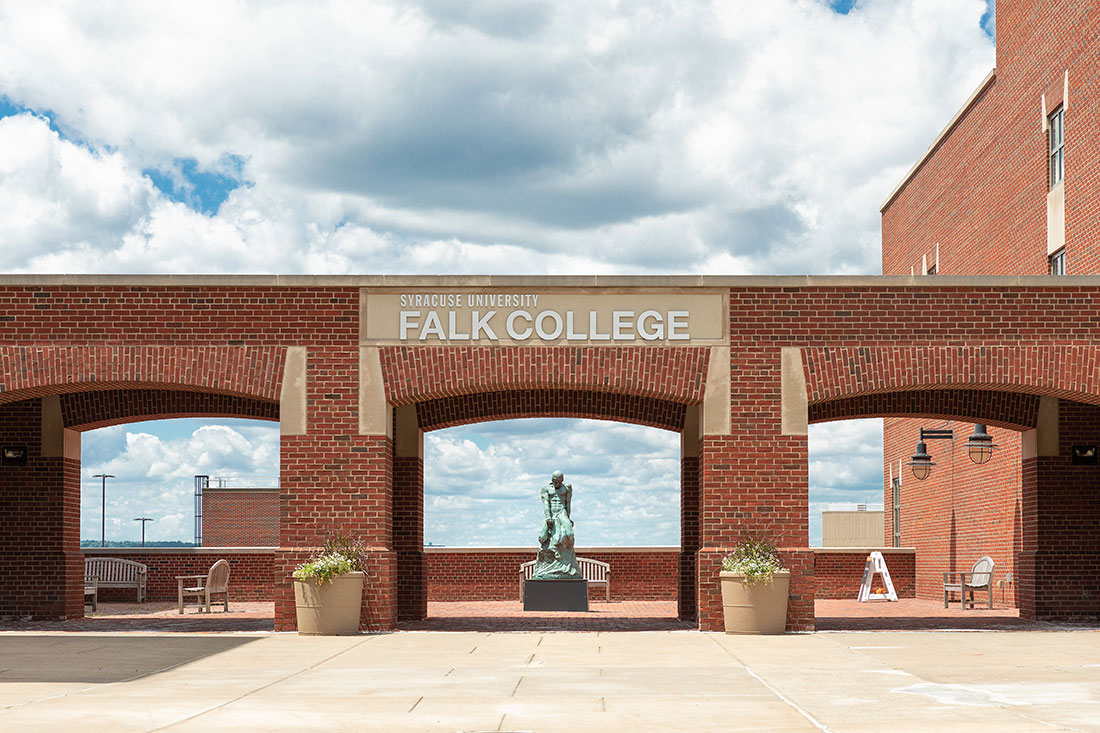
On Nov. 13, Syracuse University announced a go-forward plan to reshape the future of its human dynamics programs and reposition them for short- and long-term success. Here are frequently asked questions about the announcement:
What is the main objective of reshaping Syracuse University’s human dynamics programs?
The primary goal is to reposition and strengthen these academic programs to ensure their success and growth both in the short- and long-term. By consolidating programs and aligning them with colleges that have stronger academic synergies, Syracuse University aims to enhance the community impact, drive enrollment growth, advance research excellence, and better serve students and the broader communities in human, health, and social services.
What specific changes are being made to the human dynamics programs?
The reshaping plan involves the following key changes:
- Human Development and Family Science will merge with Marriage and Family Therapy, becoming one department (i.e., HDFS) within the College of Arts and Sciences.
- Public Health will move to the Maxwell School of Citizenship and Public Affairs.
- The School of Social Work will be housed in the School of Education.
These changes are designed to improve academic collaboration, expand research opportunities, and better align these programs with complementary academic disciplines.
When will these changes take effect?
The changes will go into effect on July 1, 2025. Students graduating through August 31, 2025, will participate in the Falk College of Sport and Human Dynamics commencement ceremonies, and students graduating after Sept. 1, 2025, will be participating in the commencement ceremonies of their new school or college. All students impacted by this transition will continue to receive their diploma from Syracuse University that includes their degree.
How were these changes determined?
These changes were based on an extensive four-month assessment conducted by the Human Dynamics Task Force, which involved input from faculty, students, alumni, and community stakeholders. The task force analyzed the current state of these disciplines, both on campus and at peer institutions, and provided recommendations, which in large part informed the go-forward plan.
Will students already enrolled in these programs be impacted by these changes?
Students currently enrolled in these programs will continue their studies as planned. Starting in Fall 2025, students enrolled in these programs will be placed within the school or college that houses their respective degree program.
Where will faculty and staff in the human dynamics programs be located after the changes?
Faculty and staff in the human dynamics programs will remain physically located in MacNaughton and White Halls–and Peck Hall for the Department of Marriage and Family Therapy–for the foreseeable future, even after the programs are realigned with other colleges.
What are the benefits of these changes for students and faculty?
For students, these changes will lead to stronger academic programs with greater interdisciplinary collaboration, enhanced research opportunities, and better preparation for future careers in human, health, and social services. For faculty, the realignment fosters stronger collaborations across colleges, supporting faculty scholarship and providing a more robust environment for research excellence.
Why is Syracuse University making these changes now?
The changes reflect Syracuse University’s commitment to adapting to the evolving educational landscape and ensuring that its human dynamics programs are positioned for long-term success. This restructuring will allow the programs to better meet the needs of students, faculty, and the communities they serve, while fostering greater academic synergies and promoting growth.
What role did the Human Dynamics Task Force play in these decisions?
The Human Dynamics Task Force, co-chaired by Falk College Associate Dean of Human Dynamics Rachel Razza and Associate Provost for Graduate Studies and Dean of the Graduate School Peter Vanable, played a central role in assessing the current state of the programs, gathering feedback from stakeholders, and formulating strategic recommendations. Their work involved cross-disciplinary collaboration and was instrumental in shaping the final plan for the realignment of these programs.
What is the long-term vision for the human dynamics programs at Syracuse University?
The long-term vision is to create stronger, more integrated programs that foster greater collaboration across disciplines and elevate the university’s impact in fields like human development, public health, marriage and family therapy, and social work. By realigning these programs with other colleges, the university aims to drive enrollment growth, enhance research, and better prepare students for professional careers in the human, health, and social services fields.
Go-Forward Plan

Following four months of deliberate assessment and cross disciplinary collaboration by members of the Human Dynamics Task Force, Syracuse University today announced a go-forward plan to reshape the future of its human dynamics programs and reposition them for short- and long-term success. The plan includes the consolidation of two departments and relocation of all human dynamics programs from the David B. Falk College of Sport and Human Dynamics to other schools and colleges with stronger academic synergies.
“From the beginning of this process, my priority has been developing and implementing a plan that repositions and strengthens the human dynamics academic programs, research and communitywide impact,” says Lois Agnew, interim vice chancellor, provost and chief academic officer. “This repositioning elevates our human dynamics programs, fosters stronger collaborations across colleges, advances faculty scholarship and better serves our students and the communities we serve.”
In June, task force members began assessing the current state of the human dynamics disciplines, both on campus and at peer institutions, aggregating feedback from key stakeholders and compiling recommendations for how these programs can be positioned for success and growth in the future. As part of the go-forward plan:
- Marriage and family therapy will merge with human development and family science and become one department within the College of Arts and Sciences.
- Public health will join the Maxwell School of Citizenship and Public Affairs.
- Social work will be housed in the School of Education.
These changes, informed in large part by task force recommendations, are designed to enhance the academic and community impact of these programs, grow enrollment, drive research excellence and strengthen the University’s long-standing commitment to preparing professionals to thrive in human, health and social services. They will go into effect July 1, 2025.
“I am grateful to the members of the task force for their thorough, thoughtful and strategic recommendations. I also extend my appreciation to the many students, faculty and staff who provided feedback along the way—through surveys, engagement sessions and other opportunities for submitting input. Their participation in this process and candid feedback were invaluable,” says Provost Agnew.
Today’s news follows an April announcement that the Falk College of Sport and Human Dynamics will become the Falk College of Sport, the first standalone college on an R1 campus that specifically focuses on sport through a holistic academic lens. As part of the Falk transformation, the University convened the Human Dynamics Task Force, co-chaired by Rachel Razza, associate dean for human dynamics, and Peter Vanable, associate provost and dean of the Graduate School. The task force, which consisted of human dynamics faculty representatives elected from each department, staff and community partners, delivered a final report to the provost last month.
“This work required a commitment to collaboration, a willingness to engage in challenging but necessary dialogue and a shared focus on the immediate and long-term future of the human dynamics academic disciplines,” says Vanable. “Associate Dean Razza and I are grateful to our fellow task force members for their time, dedication and outstanding work. We also appreciate the provost’s commitment to upholding the spirit of our recommendations and look forward to seeing these programs thrive in the future.”
Razza says, “Syracuse University has long been a leader in interdisciplinary education. The task force agreed that taking a reimagined approach to the human dynamics programs furthers our mission to provide students with a robust, future-focused education that emphasizes both theory and practice. I believe all members of the human dynamics community—students, faculty, staff and Central New York partners—benefit from this important realignment.”
Students currently enrolled in these programs will transition to their new schools and colleges effective July 1, 2025. Students enrolling in these programs in fall 2025 will matriculate into the school or college housing their academic program.
A Syracuse University News story originally published on Nov. 13, 2024.
Social Justice and Public Health
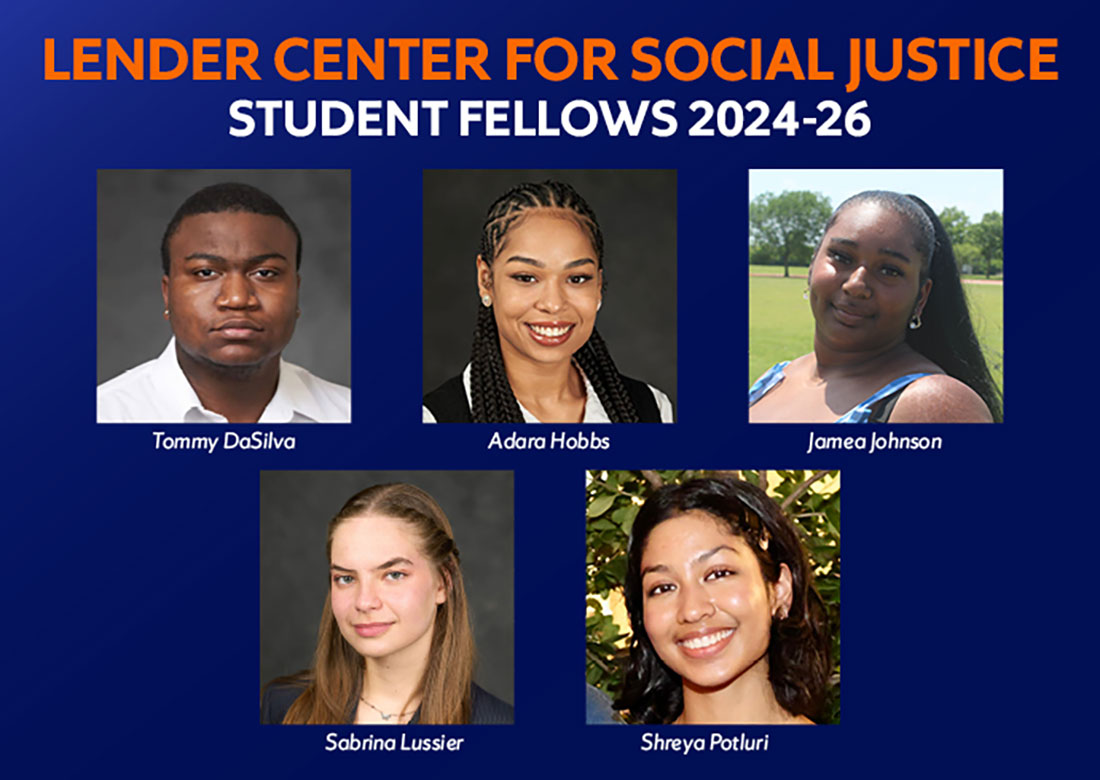
Five students will soon begin a two-year research project examining the potential social justice and public health impacts of living in neighborhoods that have experienced the historical discriminatory practice of redlining. That is a practice where, for decades, financial institutions designated certain neighborhoods—primarily Black ones—as poor credit risks, making it difficult for residents there to own homes or improve their properties.
The students, recently named 2024-26 Lender Center for Social Justice student fellows, will work with Miriam Mutambudzi, assistant professor of public health in the Falk College of Sport and Human Dynamics, who is the 2024-26 Lender Center faculty fellow.
They are:
- Tomiwa (“Tommy”) DaSilv ’26, dual major in public health in the Falk College and policy studies and citizenship and civic engagement in the Maxwell School of Citizenship and Public Affairs
- Adara (“Darla”) Hobbs ’22 G ‘26, a graduate student in Pan African studies in the College of Arts and Sciences (A&S)
- Jamea Johnson ’25, a psychology major in A&S
- Sabrina Lussier ’26, a triple major in geography, citizenship and civic engagement, and environmental sustainability and policy in the Maxwell School
- Shreya Potluri ’27, an architecture major in the School of Architecture
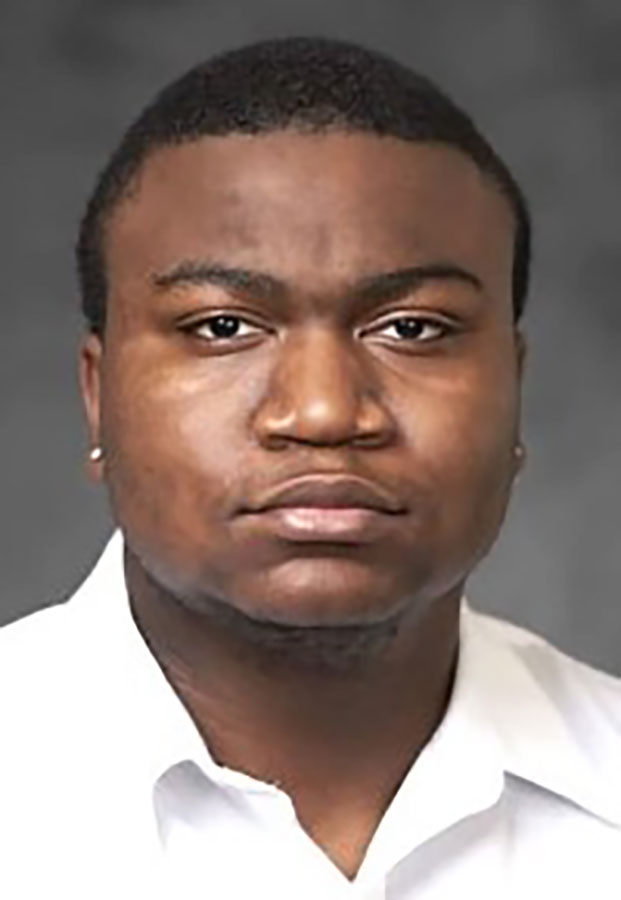
Hobbs, of Syracuse, earned a bachelor’s degree in communication and rhetorical studies from the College of Visual and Performing Arts. She has worked for more than a decade with the Syracuse City School District as a teaching assistant, art teacher and as a diversity, equity and belonging building lead. Hobbs is currently researching the historical and contemporary impacts of redlining on Syracuse’s Black and Latino communities.
Her project, “The Past, Present and Future: An Overview of Redlining in the City of Syracuse,” examines the legacy of residential redlining and resident displacement from the 15th Ward and the ongoing I-81 viaduct project. She also contributed to the development of themes and aesthetic elements for the Barner-McDuffie house, the University’s first Black student center.
Johnson, from Grand Prairie, Texas, has extensive experience in public service, entrepreneurship and community engagement. She is a Congressional intern for New York Sen. Kirsten Gillibrand, working on legislative research, policy development and constituent service. She’s also founder and chief executive officer of Black Girls Garden, an organization that teaches young Black girls and women in low-income living situations to grow their own food to combat food insecurity and poor nutrition.
She took first place in the 2023 Blackstone LaunchPad Small Business Pitch Contest for that startup and also received the 2023 Black Honor Society’s Community Service Leadership Award. On campus, she is Residence Hall Association president and a member of the Black Celestial Choral Ensemble.
Lussier, from the Washington, D.C., area, is an honors student and Maxwell Leadership Scholar. She is a STOP Bias peer educator, a resident advisor for the MORE in Leadership Living Learning Community and has spent the past year working for the Syracuse Neighborhood and Business Development Office.
Her research and academic interests focus on how urban planning intersects with community engagement, social justice and sustainability. Her citizenship capstone and honors thesis looks at the effect of freeway demolition on marginalized communities, focusing on Syracuse’s East Adams neighborhood near I-81 in the historic 15th ward.
Potluri, of Frisco, Texas, is interested in research pertaining to social justice, urban planning and housing. She has researched student learning environments, minority students’ experiences and accessibility to community spaces and facilities in the Syracuse community, along with how architecture is connected to social justice.
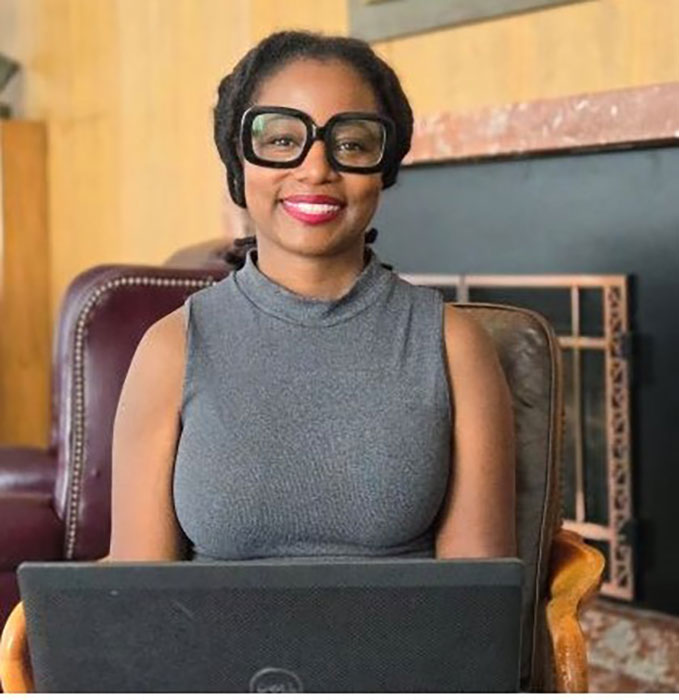
Project examines how Black adults who reside in what have been historically redlined neighborhoods can experience a disadvantaged occupational life course and subsequent health consequences. She says that while redlining began in the 1930s, it has resulted in decades of urban decay and poverty for those neighborhoods that has left a legacy of social and economic disadvantage that continues today.
In addition to Mutambudzi’s role as an assistant professor of public health, she is also a faculty affiliate of the Center for Aging and Policy Studies, Aging Studies Institute and Lerner Center for Public Health Promotion at the Maxwell School.
A Syracuse University News story by Diane Stirling originally published on Oct. 31, 2024.
Page 2 of 26
